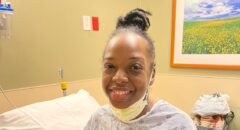 Shannon Sylvain remembers the exact moment she received the call from her doctor that would change her life forever. “My doctor asked if I was sitting down," Sylvain recalled in an interview with Essence. "After telling her yes, I remember her voice cracking when she explained that they saw evidence of colon cancer during the procedure."
Shannon Sylvain remembers the exact moment she received the call from her doctor that would change her life forever. “My doctor asked if I was sitting down," Sylvain recalled in an interview with Essence. "After telling her yes, I remember her voice cracking when she explained that they saw evidence of colon cancer during the procedure."
Sylvain was 31 years old when she was diagnosed with colorectal (colon) cancer.
Something often missing from the colon cancer conversation is women, but according to the Centers for Disease Control (CDC), Black women have the highest rate of developing colon cancer out of all women. Overall, Black men have the highest rate of getting colon cancer amongst all races.
While the risk is slightly lower for women, colon cancer remains the third leading cause of cancer deaths among White, Black, and Asian women -- right behind breast and lung cancer, the CDC reports.
A study published in the Journal of the National Cancer Institute discovered that there’s been a steady increase in the number of colon and rectal cancers among young people. Per the findings, people born in 1990 have twice the risk of colon cancer and four times the risk of rectal cancer when compared to those born in 1950.
But, there is a silver lining. Colon cancer is one of the most preventable forms – if you catch the signs early. So, what are the signs?
Blood in Your Pee or Stool
While in most cases blood in your pee or stool is associated with hemorrhoids -- clumps of enlarged blood vessels in the anus and lower rectum -- it can also be a symptom of colon cancer. Bloody urine may also signal cancer of the bladder.
Stomach Cramping
It’s not just bloating or gas. If you’re experiencing tenderness, nausea, crazy cramping or vomiting, along with the urge to take a dump – but are unable to, this could signal a more serious problem. That’s because polyps or tumors can slowly bleed into the digestive tract, robbing you of red blood cells and iron needed to carry oxygen to your body. This eventually leads to iron-deficiency anemia, which can make you feel drained and short of breath. Fortunately, a simple blood test can pinpoint whether you have a love red blood cell count – often the first sign of colorectal cancer.
Extreme Fatigue
Sure, living a hectic life can lead to extreme fatigue. But extreme tiredness that won’t let up isn’t normal. If your fatigue isn’t letting up and you have other symptoms, such as blood in your stool, consult a doctor.
Problematic Poop
Polyps or tumors associated with colon cancer may also change the consistency, shape, or frequency of bowel movements. For example, pencil thin poop happens when cancer obstructs the intestine. Constipation, diarrhea (that lasts more than 3 days), or feeling like you’re backed up, even after a bowel movement, are other possible signs of colorectal cancer, the Colon Cancer Coalition says.
Skin Changes
A change in the size, shape, or color of a mole or other spot, as well as development of new spots, are common signs of skin cancer. See your doctor for a thorough exam and perhaps a biopsy. This is one time you don't want to wait.
Trouble Swallowing
Occasional trouble swallowing is nothing to worry about. But when it happens often, especially with vomiting or weight loss, your doctor may want to check you for throat or stomach cancer.
Unexplained Weight Loss
According to the Colorectal Cancer Association of Canada, "The pain and discomfort caused by a tumor can lead to loss of appetite, which in turn results in weight loss. The unexplained weight loss can be a sign that a tumor is releasing chemicals that are increasing one’s metabolism."








